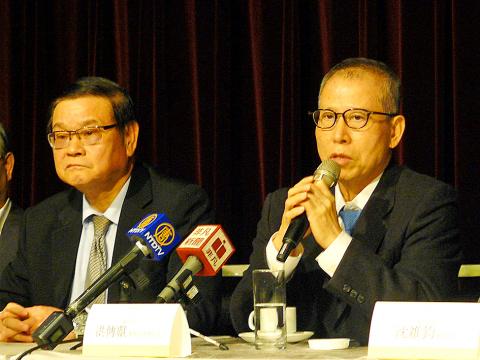Solar cell maker Neo Solar Power Energy Corp (新日光能源) yesterday said it has received government support to finance a three-way merger in the latest restructuring efforts — worth NT$5 billion (US$168.92 million) — to boost profitability by penetrating all levels of the solar supply chain.
It is a strategy created by Neo Solar and local partners Gintech Energy Corp (昱晶能源) and Solartech Energy Corp (昇陽光電) to counteract price volatility in the solar cell market by rapidly diversifying into a lucrative solar system installation business.
“We are not forming a big solar cell alliance,” Neo Solar chairman Sam Hong (洪傳獻) told a media briefing yesterday. “We are creating a different business model — a winning formula — via this three-in-one merger.”

Photo: CNA
Within five years after the merger, the new entity, which is to be named United Renewable Energy Co (UREC, 聯合再生), seeks to generate between NT$90 billion and NT$100 billion in revenue, almost doubling current revenue of NT$50 billion, Neo Solar said.
The solar system installation business would be the greatest source of revenue at about 50 percent, while solar cell and solar module businesses would constitute the remaining 50 percent, the company said.
UREC aims to build solar power plants with a capacity of 1 gigawatt (GW) each year past the initial five-year period, said Gintech president Pan Wen-whe (潘文輝), who is to serve as chief executive officer.
The merger should be completed in the third quarter of this year, Hong said, adding that he did not expect the merger to face major obstacles from the world’s competition watchdogs as the new company would only install 5GW of solar cell capacity a year.
Hong’s remarks about creating a new business model is aimed at alleviating public concern that the government’s investment might end up with a zero return as all three solar cell makers are struggling to make a profit amid steep pricing competition from China and anti-dumping probes from the global community.
The government might inject more capital than the NT$4 billion fund into UREC through the government’s National Development Fund and government affiliate Yao Hua Glass Co (耀華玻璃).
The government fund and Yao Hua would each hold through a private placement less than 6.5 percent of the company’s shares, because the government wants to play a smaller role than UREC’s biggest private shareholder, Delta Electronics Inc (台達電), which is to hold a 6.5 percent stake.
UREC also plans to raise additional funds by issuing new shares.
The company is to concentrate on installing solar systems for clients, while manufacturing solar cells, solar modules and solar wafers at lower costs due to falling raw material sourcing costs and better productivity, Hong said.

Sweeping policy changes under US Secretary of Health and Human Services Robert F. Kennedy Jr are having a chilling effect on vaccine makers as anti-vaccine rhetoric has turned into concrete changes in inoculation schedules and recommendations, investors and executives said. The administration of US President Donald Trump has in the past year upended vaccine recommendations, with the country last month ending its longstanding guidance that all children receive inoculations against flu, hepatitis A and other diseases. The unprecedented changes have led to diminished vaccine usage, hurt the investment case for some biotechs, and created a drag that would likely dent revenues and

Global semiconductor stocks advanced yesterday, as comments by Nvidia Corp chief executive officer Jensen Huang (黃仁勳) at Davos, Switzerland, helped reinforce investor enthusiasm for artificial intelligence (AI). Samsung Electronics Co gained as much as 5 percent to an all-time high, helping drive South Korea’s benchmark KOSPI above 5,000 for the first time. That came after the Philadelphia Semiconductor Index rose more than 3 percent to a fresh record on Wednesday, with a boost from Nvidia. The gains came amid broad risk-on trade after US President Donald Trump withdrew his threat of tariffs on some European nations over backing for Greenland. Huang further

HSBC Bank Taiwan Ltd (匯豐台灣商銀) and the Taiwan High Prosecutors Office recently signed a memorandum of understanding (MOU) to enhance cooperation on the suspicious transaction analysis mechanism. This landmark agreement makes HSBC the first foreign bank in Taiwan to establish such a partnership with the High Prosecutors Office, underscoring its commitment to active anti-fraud initiatives, financial inclusion, and the “Treating Customers Fairly” principle. Through this deep public-private collaboration, both parties aim to co-create a secure financial ecosystem via early warning detection and precise fraud prevention technologies. At the signing ceremony, HSBC Taiwan CEO and head of banking Adam Chen (陳志堅)

CULPRITS: Factors that affected the slip included falling global crude oil prices, wait-and-see consumer attitudes due to US tariffs and a different Lunar New Year holiday schedule Taiwan’s retail sales ended a nine-year growth streak last year, slipping 0.2 percent from a year earlier as uncertainty over US tariff policies affected demand for durable goods, data released on Friday by the Ministry of Economic Affairs showed. Last year’s retail sales totaled NT$4.84 trillion (US$153.27 billion), down about NT$9.5 billion, or 0.2 percent, from 2024. Despite the decline, the figure was still the second-highest annual sales total on record. Ministry statistics department deputy head Chen Yu-fang (陳玉芳) said sales of cars, motorcycles and related products, which accounted for 17.4 percent of total retail rales last year, fell NT$68.1 billion, or